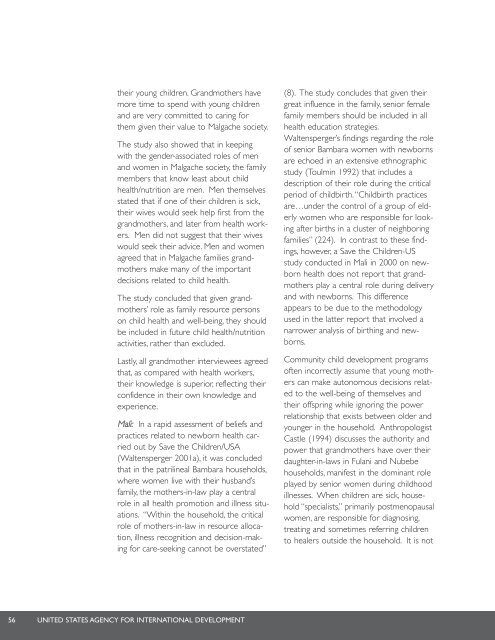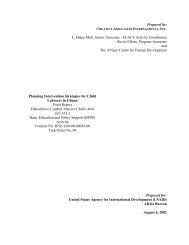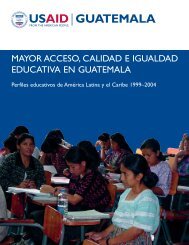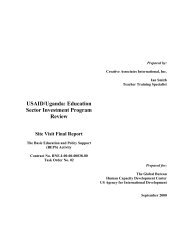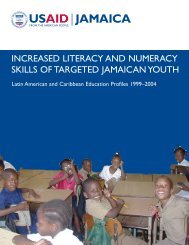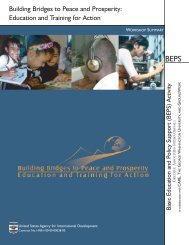Grandmothers: A Learning Institution - Basic Education and Policy ...
Grandmothers: A Learning Institution - Basic Education and Policy ...
Grandmothers: A Learning Institution - Basic Education and Policy ...
- No tags were found...
You also want an ePaper? Increase the reach of your titles
YUMPU automatically turns print PDFs into web optimized ePapers that Google loves.
their young children. <strong>Gr<strong>and</strong>mothers</strong> havemore time to spend with young children<strong>and</strong> are very committed to caring forthem given their value to Malgache society.The study also showed that in keepingwith the gender-associated roles of men<strong>and</strong> women in Malgache society, the familymembers that know least about childhealth/nutrition are men. Men themselvesstated that if one of their children is sick,their wives would seek help first from thegr<strong>and</strong>mothers, <strong>and</strong> later from health workers. Men did not suggest that their wiveswould seek their advice. Men <strong>and</strong> womenagreed that in Malgache families gr<strong>and</strong>mothersmake many of the importantdecisions related to child health.The study concluded that given gr<strong>and</strong>mothers’role as family resource personson child health <strong>and</strong> well-being, they shouldbe included in future child health/nutritionactivities, rather than excluded.Lastly, all gr<strong>and</strong>mother interviewees agreedthat, as compared with health workers,their knowledge is superior, reflecting theirconfidence in their own knowledge <strong>and</strong>experience.Mali: In a rapid assessment of beliefs <strong>and</strong>practices related to newborn health carriedout by Save the Children/USA(Waltensperger 2001a), it was concludedthat in the patrilineal Bambara households,where women live with their husb<strong>and</strong>’sfamily, the mothers-in-law play a centralrole in all health promotion <strong>and</strong> illness situations.“Within the household, the criticalrole of mothers-in-law in resource allocation,illness recognition <strong>and</strong> decision-makingfor care-seeking cannot be overstated”(8). The study concludes that given theirgreat influence in the family, senior femalefamily members should be included in allhealth education strategies.Waltensperger’s findings regarding the roleof senior Bambara women with newbornsare echoed in an extensive ethnographicstudy (Toulmin 1992) that includes adescription of their role during the criticalperiod of childbirth. “Childbirth practicesare…under the control of a group of elderlywomen who are responsible for lookingafter births in a cluster of neighboringfamilies” (224). In contrast to these findings,however, a Save the Children-USstudy conducted in Mali in 2000 on newbornhealth does not report that gr<strong>and</strong>mothersplay a central role during delivery<strong>and</strong> with newborns. This differenceappears to be due to the methodologyused in the latter report that involved anarrower analysis of birthing <strong>and</strong> newborns.Community child development programsoften incorrectly assume that young motherscan make autonomous decisions relatedto the well-being of themselves <strong>and</strong>their offspring while ignoring the powerrelationship that exists between older <strong>and</strong>younger in the household. AnthropologistCastle (1994) discusses the authority <strong>and</strong>power that gr<strong>and</strong>mothers have over theirdaughter-in-laws in Fulani <strong>and</strong> Nubebehouseholds, manifest in the dominant roleplayed by senior women during childhoodillnesses. When children are sick, household“specialists,” primarily postmenopausalwomen, are responsible for diagnosing,treating <strong>and</strong> sometimes referring childrento healers outside the household. It is not56 UNITED STATES AGENCY FOR INTERNATIONAL DEVELOPMENT


